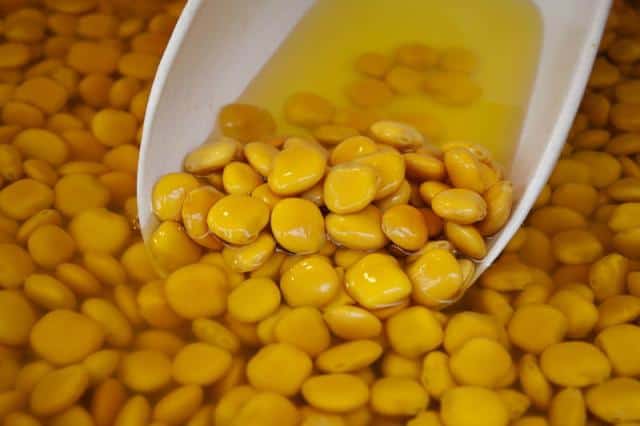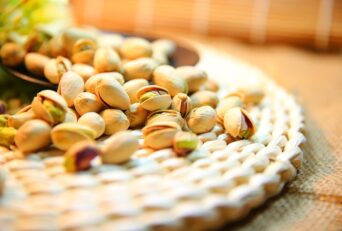Lupins are tall perennial plants consists of spiky flowers. Bitter seeds from this beautiful spike-like flowers of different colors are known as Lupini Beans.
Lupins are yellow legume seeds of Lupinus Genus. They are edible and fat in size with a much thicker and tougher skin.
The most discussed part of Lupin is its bitterness. This bitterness occurs in its yellowish needles due to a glucoside called Lupinin. They are too much bitter due to the presence of Alkaloid percentage in them.
Table of Contents
Why Are Lupin Beans Bitter In Taste?

The bitterness is highly found in traditional lupini beans than the Lupini beans available nowadays. They are bitter due to the high percentage of Alkaloid in them.
The alkaloid is one of a large group of organic and primary substances found in plants. They are usually bitter and characterized by dominant physiological activity. They are synthesized by plants and are located in the leaf, bark, seed and other parts also.
The alkaloid is often active in small amounts but toxic in large quantities. The concentration of Alkaloid percentage in bitter lupins is approximately 500mg per Kg even after soaking and cooking. But in sweet lupins, the rate is 150mg per Kg in their natural condition without soaking or cooking.
Availability
Water-soaked and boiled lupin seeds are sold in markets and bars as delicacies in many countries of the world.
Nowadays they are mostly found in Mediterranean countries and their former colonies, especially in Spain, Portugal, Italy, Brazil as well as in Egypt: Syria, Lebanon, Zordan, Israel, Turkey, Chicago little Italy and in New York City’s Spanish Harlem.
You can also get them online if it is not available in your area through Amazon.com. You can get the bottle of dry lupini seeds featured with all the instructions to prepare or to eat instantly as per your order.
If you are new to lupini beans, then remember, good lupini beans are very much similar to oyster crackers as round and palest tan in color. If the lupin you get is discolored, it is advisable to discard them.
How To Prepare?

Soaking….soaking….. and soaking…
This is the real formula to prepare the lupini beans as edible. Let me clear you.
As we have discussed earlier, lupini beans have a high concentration of Alkaloid, due to which they are bitterest. Eating them in their original condition is impossible.
On the other hand, they are very much toxic too without removing the whole percentage of Alkaloid in them.
Lupin beans have a great flavor. They are good substitutes for meat for the vegans. But the preparation of Lupini beans is very much critical to make them edible. Let’s prepare them to step by step.
Step 1 – Soak the lupins in a brine solution (salted water) and store in a jar. Keep the solution in the refrigerator for at least 24 hours.
Step 2 – Wash them thoroughly in water and again soak them in brine solution And refrigerate.
Step 3 – Change the solution twice daily. After every soak, you will find that the yellowish of brine is getting pale.
Step 4 – Continue the soaking until you get a clear solution without any yellowish colour remain in them.
Step 5 – You can taste the seeds whether they are still bitter or not. Bitter taste indicates that the Alkaloid remains in them yet.
Step 6 – This brine–changing process may take 5 to 10 days as per the alkaline percentage they contain.
Step 7 – If there is no bitterness left, then your lupin beans are ready to eat. Drizzle them with olive oil and sprinkle some freshly ground black pepper to taste.
You can serve them as an appetizer or side dish to your guests.
How To Eat?
It is fun to eat by squeezing the beans out of their shell into your mouth.
Pick up a bean, bite into the surface to make a hole. Squeeze the bottom of the skin and pop the bean into your mouth.
You have to practice them to be popped into your mouth. Or else I am sure you will never want to hit anyone else’s table with popped flying seeds. The little suckers fly like rockets when you squeeze the skin.
The skins of Lupini beans are also edible but too fibrous. The inner bean is succulent and meaty. The essence of salt, pepper, olive oil and vinegar come through nicely with every bite.
Nutritional Value
Now we have eaten the lupin beans deliciously. Let’s know about the nutritional value they contain.
a. Fibre And Micronutrients
Lupini beans come in packed with protein, B-complex vitamins, and essential minerals. 100 gm of Lupini beans contain 3.5oz of nutritional value. One cup of Lupini seed per serving contains as follows:-
- Calories – 198gms
- Protein – 9.8 gms
- Carbohydrates – 16.4 gms
- Fiber – 4.6 gms.
It is recommended that a woman should take 18% of the daily fibre whereas a man should take 12% in her/his diet. It helps in the maintenance of cardiovascular health and to control the weight. A serving of Lupini beans provides 4.9 grams of fibre and fat to your body which is ideal for your good health. It helps you to absorb certain vitamins and provides energy simultaneously.
b. Thiamine
Lupins provide a significant amount of thiamine to your body. It is a vitamin essential for the metabolism of fat and carbohydrate. Also, maintains the function of your nervous system.
It is recommended that a man should take 18% of thiamine in his regular diet whereas a woman should intake 20%. I cup of Lupini beans per serving to contain 0.22mg of thiamine.
c. Folate
1 cup of cooked lupini bean per serving contains 98 micrograms of Folate. It is 25% of the recommended daily intake of your diet. Folate controls your gene activity and helps your cells to metabolized proteins.
d. Manganese
Lupini beans are the excellent source of minerals if you will add this to your diet regularly. Manganese supports the good health of your bone, muscles, and nervous system. It also neutralizes the free radicals and prevents the cellular damages. It supports to your cartilage health also.
1 cup of Lupini beans provides 1.12mg of manganese to your body. It can make up half of the recommended manganese percentage to a male body and 62% to a female body.
e. Zinc
Zink boosts the immunity power of your body. It helps to the reproductive health of yours. It also helps the gene activity. 1 cup of cooked lupini beans boosts your Zink intake by 2.3 milligrams. It can make up 29% of Zinc intake Zinc in women and 21% of men.
An example of the common deficiency of Zinc percentage in your body is white spots in nails.
f. Magnesium
Magnesium offers muscle and nerve support to your body. Each cup of Lupini contains 90 milligrams of magnesium. It can make up 28% of the daily intake for women and 21% in men as recommended.
Magnesium helps to maintain the bone density. It contributes to the healthy cell membrane and helps in growth of cell signaling.
Intake of a smaller amount of magnesium also supports your muscle function. It is the mineral which ensures the absorption of calcium in bones but not in joints and arteries.
g. Copper
Lupini beans contain an abundant amount of copper in them which help to process iron to your body, aids in the function of your spinal cord, and brain. It strengthens your blood vessels too.
Consuming a cup of Lupini beans can increase your copper intake by 383 milligrams or 43% of the recommended daily intake.
h. Arginine
Arginine reflects a beneficial effect on the health of your blood vessels. It is an essential amino acid which helps to reduce the blood sugar level in your body along with the cholesterol level. Lupini beans are full of arginine in them. By adding them to your diet can reduce your high blood pressure also.
i. Antioxidants
Lupini beans are an excellent source of antioxidants along with a wonderful protein source for both the humans and animals. Higher consumption of these beans helps in cancer problems, diabetes and in neurogenerative diseases too.
j. Bowel Health
Lupini bean behaves like a probiotic. Therefore it helps in the boosting of your bowel health. Consuming of Lupini beans can treat constipation and IBS along with other health problems associated with poorly functioning bowel system.
k. Low Cholesterol
Due to the high content of fibre, lupins help to normalize the poor digestion in your body. It helps to prevent the symptoms of painful abdominal cramps, Nausea, vomiting, Bloating, Gastroesophageal Reflux and also in constipation.
l. Beneficial To Blood Vessels
Lupins are highly beneficial to the inner walls of your blood vessels contributing to what is called an endothelial function. Endothelial dysfunction is a major cause of cardiovascular disease leading to atherosclerosis and myocardial infarction and stroke.
m. Supports Carbohydrates Synthesis
Lupins are rich in Vitamin B, Vitamin B6 and Vitamin B9 which supports the carbohydrates synthesis in your body.
Carbohydrate synthesis is a process which provides energy to your body to maintain essential body functions such as breathing. Vitamin B9 is vital during pregnancy in women for the prevention of spinal cord effects in newborns.
n. Controls Appetite
Lupin – fortified foods help to control your appetite also. A study at the University of Western Australia found that people who had taken the bread made by Lupin in their breakfast ate up to 20% less food in their next meal in contrary to the people who had taken white bread. The people who had taken lupin bread expressed that they felt fuller very quickly. This fullness lasted till the lunch.
o. Anti-Diabetic
According to new research, an anti-diabetic activity found in lupin known as Glycoprotein. Its ability is it can efficiently cross the intestinal barriers, where it may be able to provide anti-diabetic glucose-reducing effects.
The fiber present in it also inhibits appetite by providing a satisfied feeling towards the stomach throughout the day.
Medicinal Uses Of Lupini
You can apply the paste of white lupini with water external to the ulcers and sores. Internally they are said to be anthelmintic, diuretic and emmenagogue. Lupin seeds are good to destroy the worms.
They can be used against the deformities of skin, scabby ulcers, scald heads and other cutaneous distempers.
Cook Or Not To Cook The Lupins
Lupins don’t need to be cooked to be edible whether they are sweet or bitter. But it is very much necessary to soak and debitter them properly before you eat.They are safe as raw as long as they are properly soaked as per the method we have discussed earlier in this article. Or else cook the beans to make them edible.
Are The Lupin Poisonous
Yes, they are poisonous if not prepared correctly. The alkaloids they contain need to be soaked out.
Improper preparation of bitter lupini with insufficient soaking allows pharmacologically significant amounts of the anticholinergic alkaloids to remain in the beans.
It results in the poisonous symptoms like stomach pain, anxiety malaise, etc.
Some people like bitter herbs. They should learn the unique soaking formula of lupin beans properly before consuming.
There are several references in the medical literature about the poisoning caused by errors made by you in lupini beans.
Some major symptoms of Lupini bean poison are
- Dilated unresponsive pupils
- Lack of concentration or confusion
- Flushed face with fever
- Slowed thought and disorientation
- High heart rate and blood pressure tremors
- Difficulty with or slurred speech
- In – coordination
- Dizziness
- Burning dry mouth
It is very harmful to your health to eat the lupin infected with fungus Diaporthe Toxic. This fungus is known as Phomposins which cause a disease known as Mycotoxin Lupino which can damage your liver and leads to death.
Final Thoughts
In the late 18th century, lupins came to the European soil by the efforts of Frederick the Great, the king of Prussia. From this time sweet lupins become popular in part of European cuisines.
It is said that sweet variety of lupin was 1st produced in the early 20th century by the breeders of Germany. Australia is now in rank one among the nation’s involvement in the production of sweet lupins.






